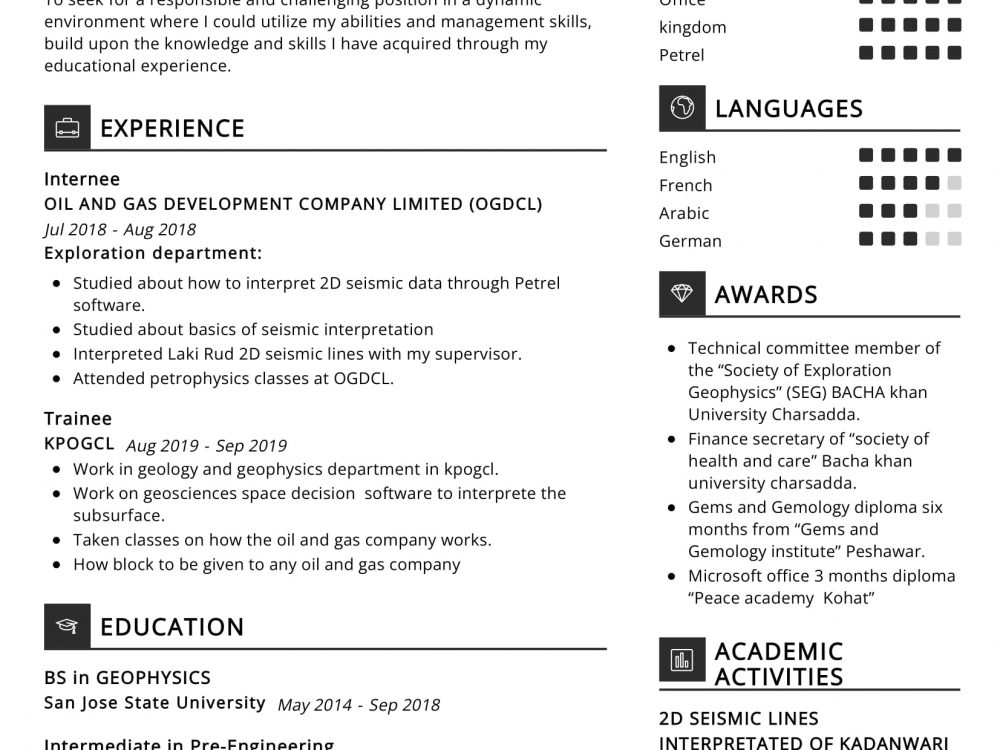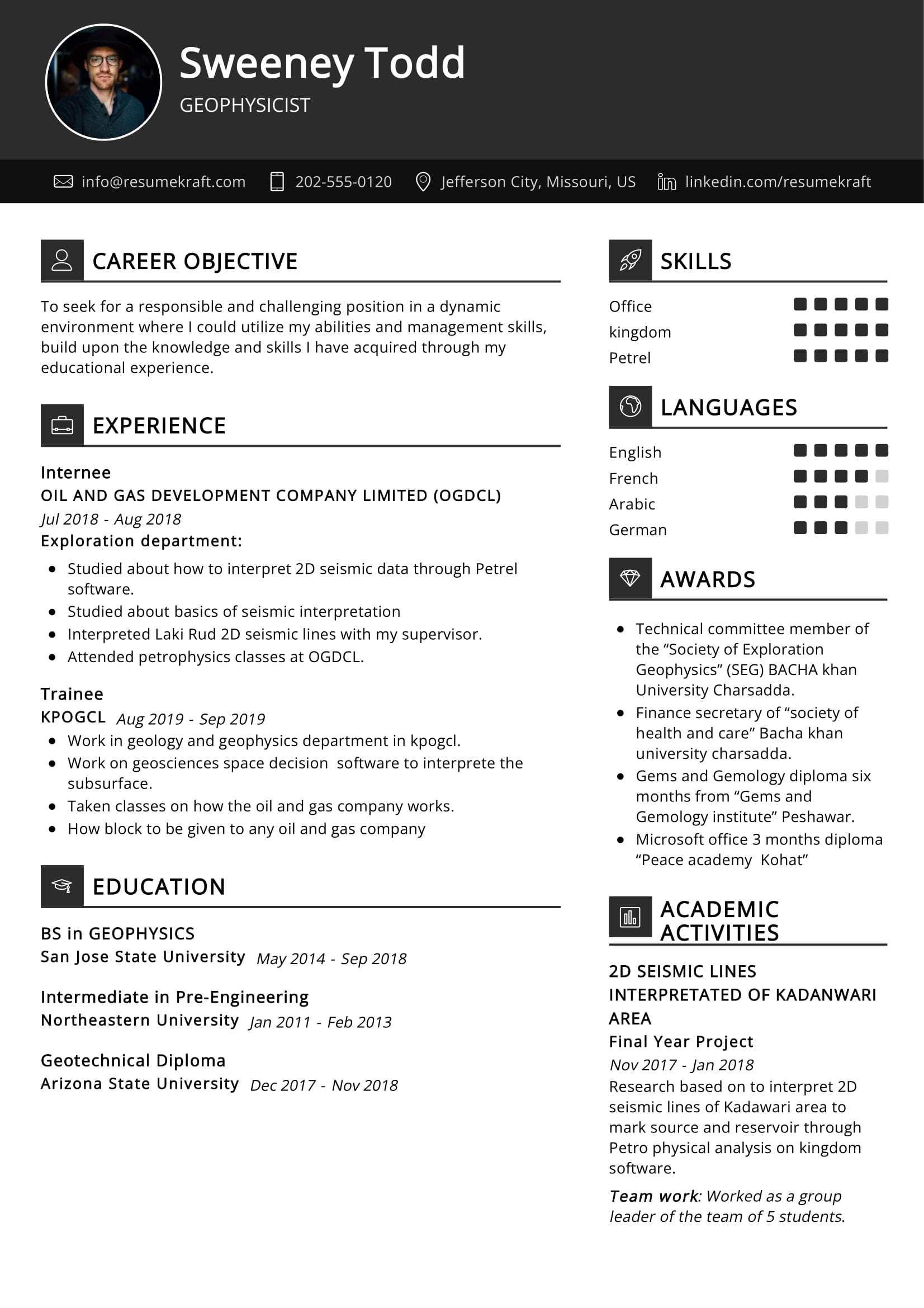What Should Be Included In A Geophysicist Resume?
A geophysicist resume should highlight the candidate’s qualifications and experience that are relevant to the job they are applying for. It should include the applicant’s educational background, professional experience, research, and any other qualifications that make them a valuable asset to the employer. An effective resume should also demonstrate the knowledge and skills necessary to perform the job.
When crafting a geophysicist resume, it is important to include all relevant education, experience, and qualifications. This should include a list of courses taken in geophysics, any publications or research projects completed, and any awards or recognitions received. It is also beneficial to include references from employers and colleagues that can vouch for the candidate’s abilities.
In addition to these qualifications, a geophysicist resume should demonstrate the applicant’s knowledge and skills in geophysics. This could include any technical skills, such as the ability to work with GIS software, as well as soft skills, such as problem-solving and communication. It is also beneficial to include any volunteer work the applicant has done in the field.
Finally, a geophysicist resume should also showcase the candidate’s enthusiasm for the field. This could include any hobbies or activities related to geophysics, such as attending academic conferences or participating in geophysics clubs. By showcasing their enthusiasm, employers can better understand the applicant’s commitment to their field.
What Skills Should I Put On My Resume For Geophysicist?
When crafting a resume for a job as a geophysicist, it is important to include all the skills and experience that make you the ideal candidate for the role. A geophysicist is a scientist who studies the physical properties of the Earth, and is often involved in research and data analysis. To be successful in this role, you need to possess a strong knowledge of the Earth’s history, geography and geology, as well as computer programming and software development skills.
In order to demonstrate your qualifications and skills, you should start by creating a comprehensive list of all your relevant experience and qualifications. This should include any research projects you have taken part in and any relevant degrees you have earned. Once you have created this list, you can use it to create a resume that highlights your skills and experience.
When it comes to the skills you should list on your geophysicist resume, it is important to include any programming skills you possess. This could include software development, data analysis and visualization, and computer modeling. Additionally, you should list any field experience that is relevant to geophysics. This could include seismic surveys or aerial surveys you have taken part in. You should also mention any presentations or talks you have given at conferences or industry events.
Finally, you should also include any other transferable skills you possess. These could include problem solving, teamwork, leadership, and communication skills. Including these skills on your geophysicist resume can help you stand out from other job applicants and demonstrate that you have the skills to be successful in the job.
What Is The Job Description Of The Geophysicist?
The job of a geophysicist is to analyze and interpret the physical properties of the Earth, such as its gravitational and magnetic fields, seismic activity, and other physical and chemical properties. They use a variety of methods and techniques to draw conclusions and identify patterns in the Earth’s physical structure.
Geophysicists use seismology and other techniques to analyze the nature and structure of the Earth’s interior, including the shape of the Earth’s core, mantle, and crust. They use gravity measurements, magnetism, and seismic wave data to determine the levels of the Earth’s temperature, pressure, and other physical properties.
Geophysicists also use seismic wave data to develop models of the Earth’s structure that can help to identify natural resources, such as oil and gas, as well as geological processes, such as fault movement and volcanism. They may also use geophysical data to study the effects of climate change on Earth’s surface features and for a variety of other applications.
Geophysicists generally work in a laboratory or office setting, but some may also be employed in the field. They typically collaborate with other scientists, such as geologists and hydrologists, to produce comprehensive studies of the Earth’s physical structure. They may also be involved in research and development of new technologies, such as deep-sea exploration, and provide geophysical advice to government and industry.
What Is A Good Objective For A Geophysicist Resume?
When writing a geophysicist resume, it is important to include an objective that clearly states what type of job you are seeking and how your skills can benefit the employer. A good objective should be specific and clearly communicate the value that you bring to the table. For example, an objective for a geophysicist might read, “Seeking a position as a geophysicist in the oil and gas industry, utilizing my expertise in seismic interpretation and well logging to contribute to the team’s success.”
In addition to a well-crafted objective, it is also important to be sure to include any relevant work experience that you may have, such as working as a research assistant or a field geologist. Be sure to list any specific tools or software that you are proficient in, as well as any special training or education that you have received related to the field.
Finally, be sure to include information about your communication and collaboration skills, as well as any projects or papers you may have worked on that are related to the position. Communication is an important part of any job, so be sure to highlight any collaborative or leadership experience as well. By including all of these elements in your geophysicist resume, you can set yourself apart from other applicants and demonstrate to potential employers why you are the ideal candidate for the job.
What Are 5 Responsibilities Of A Geophysicist?
As a geophysicist, you have a wide range of responsibilities that involve studying the physical structure of the Earth. From understanding the Earth’s internal and external structure to interpreting seismic data and analyzing geological processes, geophysicists must be well-versed in a number of topics. Here are five of the key responsibilities of a geophysicist:
- Understanding the Earth’s Internal Structure: Geophysicists employ a combination of physical, chemical, and mathematical principles to study the Earth’s internal structure. This includes analyzing seismic data to understand the internal layers of the Earth, as well as interpreting the results to understand the underlying physical processes.
- Analyzing Geological Processes: Geophysicists are integral in understanding and predicting a variety of geological processes, such as earthquakes, volcanism, and mass movement. By analyzing data from these processes, geophysicists can develop models to better understand and predict their behavior.
- Interpreting Seismic Data: Seismic data is one of the primary sources of information for geophysicists. Analysis of seismic waves can provide insight into the structure of the Earth’s interior, as well as provide information about the physical processes occurring beneath the surface.
- Working with Remote Sensing Data: Geophysicists use remote sensing data to study the Earth’s surface structure and composition. Examples of remote sensing data include images from satellites and aerial photographs, which can be used to identify geological features and to detect changes in the Earth’s surface.
- Informing Public Policy: Geophysicists also play an important role in informing public policy. By analyzing data and making predictions of geological processes, geophysicists can provide valuable insight into how humans can best interact with the environment and how to better manage natural resources. They also use their knowledge of geology to help inform decisions about public safety, such as seismic hazard analysis, which can help to identify areas at risk of earthquakes and other natural disasters.
What Are The Career Prospects In The Geophysicist?
Geophysicists are in high demand in the oil and gas industry, as well as in the fields of seismic analysis, mineral exploration, and groundwater exploration. They utilize their knowledge and skills in geology, geophysics, physics, and mathematics to assess and analyze geological structures and geological processes.
With the increasing demand for energy, the need for geophysicists is also growing. The primary career objectives of a geophysicist include finding oil and gas deposits, assessing the size and shape of natural features such as rivers and mountains, and measuring the properties of rocks, soils, and fluids.
The career prospects are quite good for geophysicists, with many companies offering competitive salaries and job stability. Those with advanced degrees and experience in the field may even become project leaders or managers, overseeing the work of other geophysicists.
The job market for geophysicists is also strong, with many employers seeking to hire qualified individuals. Many jobs are available in the oil and gas industry, but there are also opportunities in research and survey organizations, engineering firms, and universities.
In conclusion, the career prospects for geophysicists are promising and there are plenty of job opportunities. Those with advanced qualifications and experience in the field can look forward to a rewarding and secure career.


